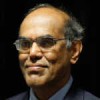Economics Nobel 2025: Why some nations achieve prosperity
Every Nobel Prize in Economics tells a story about how we understand prosperity. This year’s winners — Joel Mokyr, Philippe Aghion and Peter Howitt — have been honoured for explaining how knowledge powers economic growth and how economies renew themselves through creative destruction. Their research answers an age-old question that has puzzled thinkers from Adam Smith to Amartya Sen: Why do some nations grow while others stagnate? And it offers timely lessons for countries like India with aspirations to rapidly climb the growth ladder.
For centuries, economists have debated: What truly drives economic growth?
Early theories pointed to geography; the claim that tropical climates bred lethargy, disease and poor soil. Others emphasised natural resources, until Japan, almost barren of them, proved the theory wrong after its Meiji Restoration in 1870.
Later, scholars blamed a lack of capital or ignorance of sound policies, giving rise to the World Bank and the International Monetary Fund and their prescriptions for growth and stability. More recently, the focus shifted to institutions. Last year’s Nobel honoured Daron Acemoglu, Simon Johnson and James Robinson for showing how strong, inclusive institutions underpin prosperity. Yet none of these theories offers a fully satisfactory explanation. Geography explains location, not dynamism. Institutions matter, but they do not by themselves generate ideas. This year’s Nobel adds a crucial layer — the cultural and policy foundations that sustain continuous innovation.
Mokyr........






















 Toi Staff
Toi Staff Sabine Sterk
Sabine Sterk Penny S. Tee
Penny S. Tee Gideon Levy
Gideon Levy Waka Ikeda
Waka Ikeda Grant Arthur Gochin
Grant Arthur Gochin Beth Kuhel
Beth Kuhel
